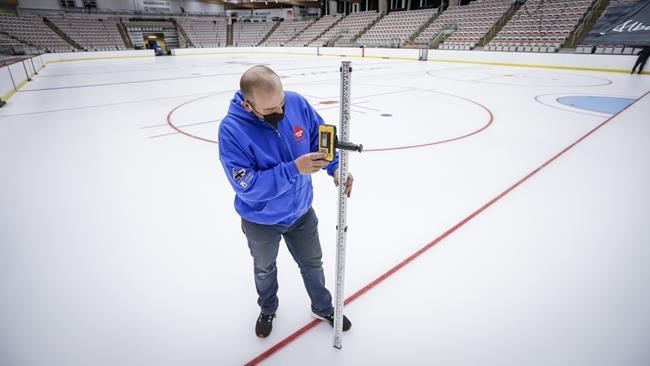CALGARY — Greg Ewasko will be an expert on curling bubble life by the time he's done tending Calgary's ice.
The icemaker from Oakbank, Man., will spend 52 days making ice for four Curling Canada events at WinSport's Markin MacPhail Centre.
Add in time he's spending to transform a hockey rink into a curling venue before the Feb. 19 start of the Scotties Tournament of Hearts, that's 63 straight days on the road.
Curling Canada is holding the national women's, men's and mixed doubles championships, and men's world championship in a controlled, spectator-free environment at one site in order to have a curling season and avoid spread of the COVID-19 virus.
Ewasko is accustomed to managing ice in multiple events in one season, but never all in one arena.
"Usually by now I have five events underneath my belt and it's kind of let's roll into the next one," he told The Canadian Press.
"The nerves are there. Just getting it done and making sure we can get it all done. It's good that nerves are there. It means I'm here for the right reasons.
"It's very important to Curling Canada and obviously to the athletes to get this off and running."
The Tournament of Hearts Feb. 19-28 will be followed by the Tim Hortons Brier March 5-14, the Home Hardware Canadian mixed doubles curling championship March 18-25, and the BKT OK Tire men's world championship April 2-11.
Ewasko, 44, says he'll head home to Manitoba to spend time with his wife and two teenage sons after the men's world championship, but it seems he can't get enough of curling ice.
He intends to return to Calgary to help out with a pair of Grand Slams scheduled for the spring.
Ewasko's wife Monique underwent radiation treatment in October for a recurring cancer.
"We found out some good news that the radiation did start to break up the three cancer cells or spots that were starting to grow again," Ewasko said.
""Everybody's OK. If we would have got the reverse news I wouldn't have been here."
Curling ice requires constant monitoring and maintenance to keep curlers happy and produce crowd-pleasing shots.
No spectators in the building altering the indoor climate takes a variable out of the icemaking equation.
"There's not going to be any kind of heat load from five thousand people being in there," he said. "Controlling the building is going to be way easier."
But there will be the extra task of sanitizing every rock handle before each draw, which is 64 rocks if all four sheets are in use.
Ewasko and his crew are required to be masked and distanced from each other on the job.
As the curlers will do, ice crew members had to have a negative COVID-19 test taken within 72 hours of departing for Calgary, and produce another upon arrival.
"I had had two people back out because they didn't think after our team meeting that we had a week and a half ago, that wearing masks and being part of the whole bubble was not going to be right for them," Ewasko said.
"It was a little bit of a scramble there last week. Had to fill one more spot."
There's the spectre of more scrambling, should someone test positive for the virus and be forced to isolate.
"I have a few backup plans in place just in case something out of the normal happens," Ewasko said. "You'd call that normal now."
The Markin MacPhail Centre is no stranger to elite curling. It was the site of the 2015 Continental Cup of Curling, pitting Canadians against Europeans in a Ryder-Cup style of competition.
An icemaker's nirvana is generating consistent ice conditions day in and day out so the curlers will attempt difficult shots with confidence.
Ewasko wants to carry predictable ice through to men's world championship final April 11.
"There's a little bit of pressure," he admitted. "Probably the biggest fear that I have is I can't make it the same for the four events. I won't sleep until I accomplish it.
"That's my biggest worry, that the ice surface and the events are going to be different. I don't want that. I want them to be as perfect as possible."
This report by The Canadian Press was first published Feb. 12, 2021.
Donna Spencer, The Canadian Press



